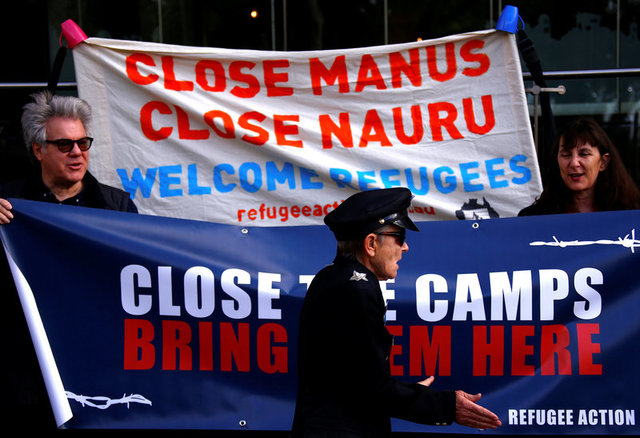UN says Papua New Guinea has ‘duty’ to care for refugees sent by Australia
 Refugee advocates hold signs as they protest against the detention of asylum seekers being held at Australian-run offshore detention centers located on Papua New Guinea’s Manus Island, and the South-Pacific island of Nauru, in central Sydney, Australia, August 31, 2017. (Photo: Reuters)
Refugee advocates hold signs as they protest against the detention of asylum seekers being held at Australian-run offshore detention centers located on Papua New Guinea’s Manus Island, and the South-Pacific island of Nauru, in central Sydney, Australia, August 31, 2017. (Photo: Reuters) Papua New Guinea has been told by the United Nations’ top human rights official that it is obligated to take care of hundreds of refugees sent there by Australia.
Zeid Ra’ad al-Hussein, UN High Commissioner for Human Rights, raised the issue with PNG Prime Minister Peter O’Neill in a meeting in the capital, Port Moresby, said Zeid’s spokeswoman Ravina Shamdasani.
Shamdasani said Zeid and O’Neill discussed the need for PNG to ensure that refugees were living in “satisfactory” conditions with protection for their human rights.
“That is the duty of the state of Papua New Guinea – to ensure that happens while they’re on their territory,” she told the Thomson Reuters Foundation by phone from Fiji’s capital, Suva, where the delegation travelled after leaving PNG.
“He will certainly be following up with Australia as well,” Shamdasani said.
Officials in PNG were unavailable for comment.
The refugees, from countries including Pakistan, Sudan and Iran, were trying to reach Australia, which has a policy against what the government calls “illegal maritime arrivals”.
After detaining the refugees at sea, Australia transported them to “offshore processing centres” that it opened in 2013 on Manus Island in PNG and on the tiny Pacific island nation of Nauru.
In 2016, PNG’s Supreme Court ruled it was illegal to detain the nearly 800 refugees, as well as asylum seekers who have not been registered as refugees, on Manus Island.
In October, Australia withdrew all services to the facility and said it would fund three new “transit centres” on Manus, where refugees would be provided with security, healthcare and money to buy food.
But in a report last week, Amnesty International said the refugees were “at risk of violence from the local community and the authorities, who have disavowed responsibility for them”.
Amnesty said conditions at the transit centres were unsafe, adding that police had failed to investigate robberies and assaults against some refugees. The organisation also said PNG police had extorted bribes from some refugees.
The rights group accused Australia of offloading its responsibility on to PNG – which has high rates of poverty and violence – and which it said was “both unwilling and unable to settle refugees safely and with dignity”.
An official at the Australian Border Force said the government had previously replied to criticisms of its policies, including in a November statement that said the new transit centres provided “clean, safe alternative accommodation”.
Reuters



